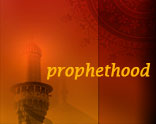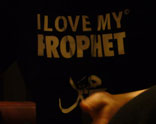Muhammad, the Prophet, and Fatimah, the Radiant
This section deals with the Prophet Muhammad, may Allah's blessings be upon him and the people of his household: his lineage, birth, the time of his call by Allah to apostleship, his age and the time of his death, his epithets and characteristics, the proofs of his Prophethood, and his miracles, his children and wives, and his paternal and maternal uncles. It provides information concerning some of his battles and other events of his life. It consists of six chapters; the first, divided into three sections, deals with his lineage and birth, his age and the time of his death.
His Birth And Lineage, And The Time Of His Death
The Prophet Muhammad was born on Friday before sunrise on the 17th of Rabi `u 'l-Awwal in the `Year of the Elephant', 570/71.
According to Sunni tradition, he was born on Monday. Traditionists have, however, differed concerning the date. Some said it was on the second night of Rabi'u'l-Awwal, others on the tenth. This was after thirty-four years and eight months of the reign of Anushirwan son of Qubad, King of Persia, who killed Mazdak and exterminated the Dualists.
It is to this that the hadith attributed to the Messenger of Allah refers: "I was born during the reign of the just and righteous King." His birth occurred also after eight years and eight months of the reign of `Amr ibn Hind, King of the Arabs. His agnomen was Abu 'l-Qasim. Anas ibn Malik reported that, "When Ibrahim son of the Prophet was born, Gabriel came to him and said, `Peace be upon you, O Abu Ibrahim'. "
His genealogy is as follows: Muhammad ibn `Abdillah ibn `Abdi 'l-Muttalib - whose name was Shaybatu'l-Hamd - ibn Hashim - whose name was `Amr - ibn `Abd Manaf - whose name was al-Mughirah - ibn Qusayy - whose name was Zayd - ibn Kilab ibn Murrah ibn Ka'b ibn Lu'ayy ibn Ghalib ibn Fihr ibn Malik ibn an-Nadr - known as Quraysh - ibn Kinanah ibn Khuzaynah ibn Mudrikah ibn Ilyas ibn Mudar ibn Nizar ibn Ma'add ibn `Adnan. It is reported that the Prophet said, "When my genealogy reaches `Adnan, then go no further". It is also related on the authority of Umm Salamah the wife of the Prophet, who said, "I heard the Prophet say (recounting his own lineage), `Ma'add ibn `Adnan ibn Udad ibn Zayd ibn Thara ibn A'raqu 'th-Thara'." Umm Salamah also said: "Zayd is Hamaysa'; and Thara is Nabt; and A'raqu 'th Thara is Isma'il (Ishmael) ibn Ibrahim (Abraham)." She continued: "Then the Apostle of Allah recited, ' Ad, Thamud and the people of the well (Rass) and many generations between' [Qur'an. 25:38], which only Allah knows."
Ash-Shaykh Abu Ja'far ibn Babawayh, may Allah be pleased, with him, reported another genealogy as follows: `Adnan ibn Udd ibn Udad ibn Yamin ibn Yashjub ibn Munhar ibn Sabugh ibn Hamaysa` ; or in another version: `Adnan ibn Udad ibn Zayd ibn Yaqdud ibn Yaqdum al-Hamaysa` ibn Nabt ibn Qaydar ibn Isma'il ibn Ibrahim. It is generally believed by most historians and genealogists that `Adnan was Udd ibn Udad ibn al.-Yasa` ibn al-Hamaysa` ibn Salaman ibn Nabt ibn Hamal ibn Qaydar ibn Isma'il ibn lbrahim ibn Tarih ibn Takhar ibn Sarakh ibn Ar'awa' ibn Faligh ibn `Abir, who was the Prophet Bud. Had was the son of Shalikh ibn Arfakhshadh ibn Sam (Shem) ibn Nah [Noah] ibn Lamk ibn Mattushalakh [Methuselah] ibn Ukhnakh, who was the Prophet Idris [Enoch]. Ukhnakh was the son of Yarid ibn Mahla'il ibn Qaynan ibn Unash ibn Shith [Seth] ibn Adam, the father of humankind.
The Prophet's mother was Aminah bint (daughter of) Wahb ibn `Abd Manaf ibn Zuhrah ibn Kilab ibn Murrah ibn Ka'b ibn Lu'ayy ibn Ghalib.
Halimah daughter of `Abdullah ibn al-Harith ibn Shijnah as-Sa'diyyah of the (tribe of) Bana Sa'd ibn Hawazin nursed him until he reached the age of weaning. Thuwaybah, the servant of Aba Lahab ibn `Abdi l-Muttalib, also nursed him while nursing her own son Masrah. This was before Halimah accepted the task. Thuwaybah died a Muslim in the seventh year of the Hijrah, and her son died before her. She had also nursed Hamzah ibn `Abdi'I-Muttalib, the Prophet's paternal uncle. Thus the Messenger of Allah said of Hamzah's daughter: "She is the daughter of my nursing brother." Hamzah was four years older than the Apostle of Allah. As for his grandmother, the mother of his father `Abdullah, she was Fatimah daughter of `Amr ibn `A'idh ibn `Imran ibn Makhzum. The mother of `Abdu 'l-Muttalib was Salma daughter of `Amr of the tribe of an-Najjar. Hashim's mother was `Atikah daughter of Murrah ibn Hilal of the tribe of Sulaym. Qusayy and Zuhrah's mother was Fatimah daughter of Sa'd of the tribe of Azdu 's-Sarat.
The Prophet proclaimed his apostleship on the twenty-seventh of the month of Rajab. He was then forty years of age, and died on Monday, two nights before the end of Safar in the eleventh year of the Hijrah. He was then sixty-three years old.
His Names, Epithets And Honorable Lineage
Among his names are those which are in the Qur'an; they are as follows: the Apostle, and the unlettered Prophet, as Allah says: They who follow the Apostle, the unlettered Prophet whom they find inscribed in the Torah and the Gospel [Qur'an. 7:157]. Others are: al-muzammil (enshrouded) and al-mudaththir (enwrapped), as in Allah's saying: ﴾O you who are enshrouded, and O you who are enwrapped﴿ [see Qur'an. 73:1 and 74:1 ]. Still others are: an-nadhir al-mubin (the clear warner), as Allah says: ﴾Say, I am the clear warner﴿ [Qur'an. 15:89], and Ahmad, as Allah says: ﴾and announcing the coming of an apostle after me, whose name is Ahmad﴿ [Qur'an. 61:6].
His name Muhammad is also mentioned, where Allah says: Muhammad is the Apostle of Allah [Qur'an. 48:29], and al-Mustafa, as in Allah's saying: ﴾Allah elects Messengers from among angels and men﴿ [Qur'an. 22:75]. He is also called karim (noble), as in Allah's saying: It is surely the speech of a noble Messenger [Qur'an. 69:40]. Allah called him nur (light), as in His saying: There have come to you from Allah a light and a clear Book [Qur'an. 5:15 ]. He also called him ni`mah (favor) in His saying: ﴾They know Allah's favor, yet they deny it﴿ [Qur'an. 16:83 ], and rahmah (mercy), as He says: ﴾We have not sent you, except as a mercy to humankind﴿ [Qur'an. 21:107 ]. He also called him abd (servant), as Allah says: ﴾It is He who sent down the criterion (Furqan) to His servant﴿ [Qur'an. 25:1 ]. He is called ra`uf rahim (kindly and compassionate), as in Allah's saying: ﴾He is kindly and compassionate toward the people of faith﴿ [Qur'an. 9:128]. Allah called him shahid (witness), mubashshir (bearer of glad tidings) nadhir (warner) and da`i (summoner), as He says: ﴾We have sent you as a witness, bearer of glad tidings, warner, a summoner to Allah by His leave, and a luminous lamp﴿ [Qur'an. 33:45 - 6]. Allah also called him mundhir (warner), as in His saying: You are surely a warner [Qur'an. 13:7]. Allah called him `abd Allah (God's servant) as in His saying: ﴾When the servant of Allah rose up to summon him, they nearly rushed at him in crowds﴿ [Qur'an. 72:19]. Allah called him mudhakkir (reminder) in His saying: ﴾You are surely a reminder﴿ [Qur'an. 88:21]. Allah also called him Taha and Yasin.
Others of the Prophet's names and epithets are reported in the hadith. Thus Muhammad ibn Isma'il al-Bukhari reported on the authority of Jubayr ibn Mut'im that he heard the Apostle of Allah says: "I have many names: I am Muhammad, I am Ahmad. I am al-mahi (the effacer), for through me Allah shall efface rejection of faith. I am al-hashir (the gatherer), for all men shall be gathered at my heels (on the last day). I am al-aqib (the last to follow), after whom there shall be no other (prophet)." In another tradition: "I am the effacer" is taken to mean, he through whom the sins of those who follow him shall be effaced. In yet another tradition he is called al-muqaffi (that is he who followed all other prophets), nabiyyu't-tawbah (the prophet of penitence), nabiyyu'I-malhamah (the prophet of war), al-khatim (the seal), al ghayth (the succorer), and al-mutawakkil (he who trusts in Allah).
The names of Muhammad in ancient scriptures are also numerous. Some of these are: ma'udh ma'udh, which is in Hebrew in the Torah. In the Psalms his name is Faruq (the one through whom falsehood is distinguished from truth).
Ash-Shaykh Abu Bakr Ahmad al-Bayhaqi related in his book Dala'ilu'n-Nubuwwah on the authority of Ibn `Abbas, who said that the Messenger of Allah said, "Allah, exalted is He, divided creatures into two groups, and placed me in the best group. Thus Allah speaks of the people of the right and the people of the left [see Qur'an. 90:18-19] ; I am of the people of the right, and I am the best of the people of the right. Allah then divided the two groups into three, and placed me in the best third. This is clear from His saying: And the people of the right hand, who are the people of the right hand? And the people of the left, who are the people of the left? And those who precede, precede: they are the ones brought near [Qur'an. 56:8-10]. I am among those who precede, and I am the best of those who precede (that is in accepting true faith and in the performance of good deeds). Allah then divided these three groups into different tribes and placed me in the best tribe. Thus He says: ﴾We made you into nations and tribes﴿ [Qur.49:13]. I am the most righteous of the children of Adam, and the noblest of them in the sight of Allah. I do not boast. Allah then made of the tribes different houses and placed me in the best house. Thus He says: ﴾Surely Allah wishes to remove all abomination from you people of the house and purify you with a great purification﴿ [Qur'an. 33:33]. I and the people of my household are therefore purified from all sins."
Al-Hakim Abu `Abdillah reported on the authority of Sufyan ibn `Uyaynah who said: "The best verse which the Arabs recited is that which Abu Talib recited concerning the Prophet
And (Allah) derived for him a name from His name in order that He might exalt him;
The Lord of the Throne is Mahmud, and he is Muhammad.
Others said that this verse was composed by Hassan ibn Thabit (the famous poet of the Prophet) as part of a poem which begins with the words:
Do you not see that Allah sent His servant with His clear proof;
For Allah is Most High and Most Glorious.
Among the Prophet's epithets mentioned in the hadith are: `the camel rider', `eater of the shoulder', `prohibiter of the eating of dead animals', `he who accepts gifts', `the seal of Prophethood', `holder of the thick staff' (as a sign of authority), and `the messenger of mercy'. It is said that his agnomen (kunyah) in the Torah is Abu 'l-Aramil (the man who cares for widows), and his name is the man of the thick staff.
* A Partial translation of I'lamu 'l Wara bi Alami 'l-Huda. By Abu Ali al Fadl ibn al Hasan ibn al Fadl at Tabarsi (c. 468/1076 - 548/1154). Translated by Dr. Mahmoud Ayoub and Dr. Lynda Clarke. Published by: World Organization For Islamic Services. Tehran, Iran. Chapter 1. The Holy Prophet of Islam.




















